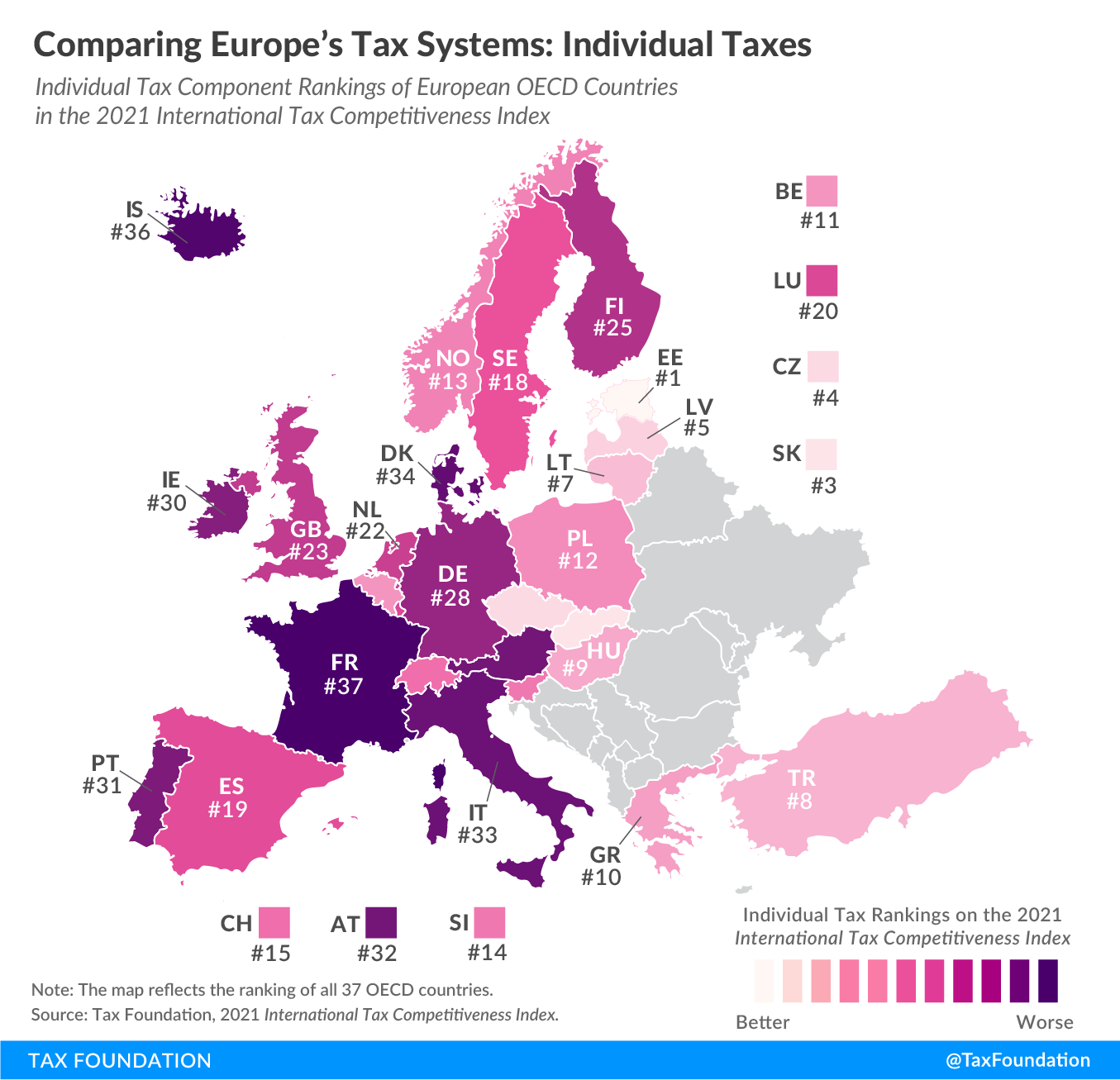Products You May Like
Our recently published 2021 International Tax Competitiveness Index (ITCI) measures and compares how well OECD countries promote sustainable economic growth and investment through competitive and neutral tax systems. This week, we examine how European OECD countries rank on individual taxes, continuing our series on the ITCI’s component rankings.
The ITCI’s individual tax component scores OECD countries on their top marginal individual income tax rates and thresholds, on how complex the income tax is, and on the tax rates levied on income from capital gains and dividends.
Estonia has the most competitive individual tax system in the OECD. The Baltic country levies a top marginal income tax rate of 20 percent on wage income, the second lowest rate in the OECD. Estonia applies the top rate at 0.4 times the average national income, making it a relatively flat income tax.
Estonia’s labor tax payments are largely automated, resulting in one of the easiest income tax systems to comply with in the OECD. An Estonian business spends on average only 31 hours a year to comply with labor taxes, compared to the highest compliance burden of 169 hours, in Italy.
Due to Estonia’s cash-flow tax on business profits, there is no separate levy on dividend income, setting the dividend’s tax rate to zero percent. Capital gains are taxed at a rate of 20 percent, close to the OECD average of 19.1 percent and aligned with its corporate tax.
In contrast, the French individual income tax system is the least competitive of all OECD countries. France’s top marginal tax rate of 55.4 percent is applied at 15.4 times the average national income. It takes French businesses on average 80 hours annually to comply with the income tax. Capital gains and dividends are taxed at comparably high top rates of 30 percent and 34 percent, respectively.
Click here to see an interactive version of OECD countries’ individual tax rankings, then click on your country for more information about the strengths and weaknesses of its tax system and how it compares to the top and bottom five countries in the OECD.
To see whether your country’s individual tax rank has improved in recent years, check out the table below. To learn more about how we determined these rankings, read our full methodology here.
| OECD Country | 2019 Rank | 2020 Rank | 2021 Rank | Change from 2020 to 2021 |
|---|---|---|---|---|
| Australia (AU) | 16 | 17 | 17 | 0 |
| Austria (AT) | 31 | 31 | 32 | -1 |
| Belgium (BE) | 9 | 10 | 11 | -1 |
| Canada (CA) | 27 | 27 | 27 | 0 |
| Chile (CL) | 25 | 35 | 35 | 0 |
| Colombia (CO) | 1 | 1 | 2 | -1 |
| Czech Republic (CZ) | 4 | 4 | 4 | 0 |
| Denmark (DK) | 35 | 34 | 34 | 0 |
| Estonia (EE) | 2 | 2 | 1 | 1 |
| Finland (FI) | 26 | 25 | 25 | 0 |
| France (FR) | 36 | 36 | 37 | -1 |
| Germany (DE) | 29 | 28 | 28 | 0 |
| Greece (GR) | 11 | 11 | 10 | 1 |
| Hungary (HU) | 10 | 9 | 9 | 0 |
| Iceland (IS) | 34 | 33 | 36 | -3 |
| Ireland (IE) | 30 | 29 | 30 | -1 |
| Israel (IL) | 37 | 37 | 29 | 8 |
| Italy (IT) | 33 | 32 | 33 | -1 |
| Japan (JP) | 23 | 22 | 21 | 1 |
| Korea (KR) | 24 | 24 | 24 | 0 |
| Latvia (LV) | 7 | 6 | 5 | 1 |
| Lithuania (LT) | 5 | 8 | 7 | 1 |
| Luxembourg (LU) | 19 | 19 | 20 | -1 |
| Mexico (MX) | 17 | 16 | 16 | 0 |
| Netherlands (NL) | 22 | 23 | 22 | 1 |
| New Zealand (NZ) | 6 | 5 | 6 | -1 |
| Norway (NO) | 15 | 15 | 13 | 2 |
| Poland (PL) | 12 | 12 | 12 | 0 |
| Portugal (PT) | 32 | 30 | 31 | -1 |
| Slovak Republic (SK) | 3 | 3 | 3 | 0 |
| Slovenia (SI) | 14 | 14 | 14 | 0 |
| Spain (ES) | 18 | 18 | 19 | -1 |
| Sweden (SE) | 20 | 20 | 18 | 2 |
| Switzerland (CH) | 13 | 13 | 15 | -2 |
| Turkey (TR) | 8 | 7 | 8 | -1 |
| United Kingdom (GB) | 21 | 21 | 23 | -2 |
Was this page helpful to you?
Thank You!
The Tax Foundation works hard to provide insightful tax policy analysis. Our work depends on support from members of the public like you. Would you consider contributing to our work?
Contribute to the Tax Foundation
Share This Article!
Let us know how we can better serve you!
We work hard to make our analysis as useful as possible. Would you consider telling us more about how we can do better?
